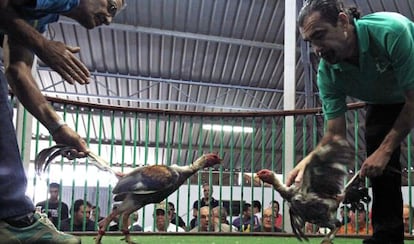Cockfighting ban for Canary Islands fizzles out in Congress
Proponents of the activity claim it is a part of the archipelago’s cultural heritage

Cockfighting organizers in the Canary Islands were relieved on Wednesday when the ruling Popular Party (PP) in Congress struck down a text from the proposed penal code reform that would have banned the blood sport, which up until now has been protected under a cultural heritage legal clause.
Catalan Republican Left (ERC) lawmakers had submitted two amendments that called for severe penalties, including six months to two years in prison, for those convicted of organizing cockfights.
Catalan leftists want up to two-year jail sentences for cockfighting organizers
The Canary Islands and Andalusia are the only two Spanish regions where the age-old betting sport is legal. The Animal Protection Law of 1991 permits it by recognizing cockfighting as part of the archipelago’s culture, going back some 500 years.
As with bullfights, this has not stopped the heated debate between animal rights groups and organizers. Pedro Hernández, a member of the campaigning NGO El Gincho, believes that this “chapter in history” needs to be closed.
“We cannot keep falling back on the argument that it is a tradition when we are talking about the lives of animals,” he said. “In the same way that our society has changed its values toward the environment, they have also changed their opinions when it comes to the lives of animals.”
Just like his father, Manuel Ojeda, a 55-year-old resident of Telde, Gran Canaria, has been raising roosters all his life and now he has passed down the tradition to his sons. He calls it “a gentleman’s sport.”
“Roosters have an instinct to fight that they carry in their genes. They begin fighting with their brothers when they are small, and we have to keep on separating them so that they won’t hurt themselves,” said Ojeda, who owns about 70 fighting birds.
Roosters are ready to fight when they reach about 18 months. Some can lose their eyes in the ring, and one out of 10 die after a match.
“If we didn’t hold these fights, the Canary fighting rooster species would become extinct,” argues José Luis Martín, president of the Canary Cockfighting Federation, which is made up of about 700 members.
There is no species because it doesn’t possess any distinctive phenotypes; they are only products of continuous inbreeding”
But María Luisa Fernández, vicepresident of the Veterinarians Association of Sant Cruz de Tenerife, refuted that argument.
“There is no such species because it doesn’t possess any distinctive phenotypes; they are only products of continuous inbreeding,” she said.
The penal code reform has now reached the Senate, where the ERC will have another chance to include the cockfight ban as part of the new law. But the lobbying efforts against it will continue.
Martín, the president of the Canary Cockfighting Federation, said he will write a letter to the Senate explaining his position, and try to convince lawmakers that cockfights cannot be compared with “dog fighting.”
“Our sport is legal,” he said.
Tu suscripción se está usando en otro dispositivo
¿Quieres añadir otro usuario a tu suscripción?
Si continúas leyendo en este dispositivo, no se podrá leer en el otro.
FlechaTu suscripción se está usando en otro dispositivo y solo puedes acceder a EL PAÍS desde un dispositivo a la vez.
Si quieres compartir tu cuenta, cambia tu suscripción a la modalidad Premium, así podrás añadir otro usuario. Cada uno accederá con su propia cuenta de email, lo que os permitirá personalizar vuestra experiencia en EL PAÍS.
¿Tienes una suscripción de empresa? Accede aquí para contratar más cuentas.
En el caso de no saber quién está usando tu cuenta, te recomendamos cambiar tu contraseña aquí.
Si decides continuar compartiendo tu cuenta, este mensaje se mostrará en tu dispositivo y en el de la otra persona que está usando tu cuenta de forma indefinida, afectando a tu experiencia de lectura. Puedes consultar aquí los términos y condiciones de la suscripción digital.








































